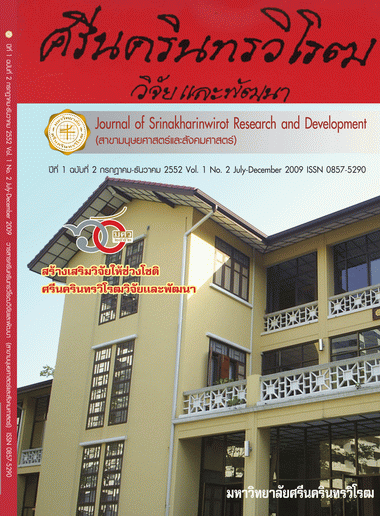ลยุทธ์การพัฒนาการบริหารจัดการงานวัฒนธรรมชุมชน: ศึกษากรณี จังหวัดอุตรดิตถ์ (STRATEGY ON DEVELOPMENT OF ADMINISTRATIVE MANAGEMENT FOR COMMUNITY CULTURE: CASE STUDY OF UTTARADIT PROVINCE)
Keywords:
Strategy, Development of administrative management, Community culture, Uttaradit provinceAbstract
บทคัดย่อการศึกษาเรื่องกลยุทธ์การพัฒนาการบริหารจัดการงานวัฒนธรรมชุมชน ศึกษากรณีจังหวัดอุตรดิตถ์ มีวัตถุประสงค์เพื่อ 1) ศึกษาสภาพทั่วไปที่เกี่ยวข้องกับการบริหารจัดการงานวัฒนธรรมชุมชนจังหวัดอุตรดิตถ์ 2) ศึกษาสภาพการบริหารจัดการองค์กรวัฒนธรรมชุมชนจังหวัดอุตรดิตถ์ 3) ศึกษาสภาพการบริหารจัดการงานวัฒนธรรมชุมชนจังหวัดอุตรดิตถ์ 4) วิเคราะห์ จุดแข็ง จุดอ่อน โอกาสที่เอื้อ และภาวะคุกคาม ในการบริหารจัดการงานวัฒนธรรมชุมชนจังหวัดอุตรดิตถ์ 5) เพื่อกำหนดกลยุทธ์การพัฒนาการบริหารจัดการงานวัฒนธรรมชุมชนจังหวัดอุตรดิตถ์ ซึ่งการดำเนินการวิจัยได้ใช้วิธีวิจัยเชิงคุณภาพ (Qualitative Research) และวิธีวิจัยเชิงปริมาณ (Quantitative Research) โดยใช้เครื่องมือในการเก็บรวบรวมข้อมูลที่มีรูปแบบลักษณะแตกต่างกันคือ การศึกษาจากเอกสาร (Documentary Study) ตำรา งานวิจัย การสัมภาษณ์เชิงลึก (In-depth Interview) แบบสอบถาม (Questionnaire) การสนทนากลุ่ม (Focus Group-Discussion) และการสัมมนาพิจารณ์ (Public Forum)
ผลการวิจัยในภาพรวม พบว่า สภาพทั่วไปการบริหารจัดการ/ด้านยุทธศาสตร์ นโยบายภาครัฐ การนำนโยบายภาครัฐสู่การปฏิบัติยังไม่ประสบผลสำเร็จ/ด้านสังคมชุมชน ขาดความรู้ความเข้าใจ จิตสำนึก ทัศนคติ ความรักและความหวงแหนต่อวัฒนธรรมในท้องถิ่นของตน/ด้านการเมือง องค์กรปกครองส่วนท้องถิ่นต้องเข้ามามีบทบาทในการอนุรักษ์ ฟื้นฟูวัฒนธรรมในท้องถิ่นของตนมากยิ่งขึ้น และการสร้างความสัมพันธ์วัฒนธรรมระหว่างประเทศเพื่อนบ้านลดน้อยลง/ด้านเศรษฐกิจ ขาดประสิทธิภาพการเสริมสร้างรายได้จากทุนทางวัฒนธรรมในท้องถิ่นและขาดงบประมาณสนับสนุน/ด้านเทคโนโลยี ขาดความรู้ความเข้าใจในการนำเทคโนโลยีมาใช้กับงานวัฒนธรรมและขาดงบประมาณสนับสนุน/ด้านโลกาภิวัตน์ มีวัฒนธรรมจากภายนอกเข้ามาแทรกแซงวัฒนธรรมแบบดั้งเดิมในชุมชน/ด้านสภาพแวดล้อมทั่วไป ขาดการมีส่วนร่วมจากภาคเอกชน และภาคธุรกิจ สภาพการบริหารจัดการองค์กรวัฒนธรรม/ด้านการวางแผน ขาดเป้าหมายหลักในการทำงานร่วมกัน ขาดการติดตามและการประเมินผลร่วมกัน/ด้านบุคลากร ขาดความรู้ความเข้าใจ ทัศนคติและขวัญกำลังใจ/ด้านงบประมาณ การสนับสนุนงบประมาณยังไม่เพียงพอ/ด้านการบริหารงานทั่วไป งานบริการวิชาการยังไม่ครอบคลุมพื้นที่ชุมชน และขาดการประสานการทำงานร่วมกับองค์กรภาคเอกชน ภาคธุรกิจ และภาควิชาการ สภาพการบริหารจัดการงานวัฒนธรรม/ด้านการอนุรักษ์ การฟื้นฟู การพัฒนา การส่งเสริม การถ่ายทอด การแลกเปลี่ยน การเชิดชู และการวิจัย การสนับสนุนขาดความต่อเนื่อง งบประมาณไม่เพียงพอ ขาดการประชาสัมพันธ์ ขาดการติดตามและประเมินผล
จุดแข็ง: มีทุนทางวัฒนธรรมในท้องถิ่นที่หลากหลาย
จุดอ่อน: องค์กรวัฒนธรรมยังไม่เข้มแข็ง ทัศนคติชุมชน และงบประมาณไม่เพียงพอ
โอกาส: รัฐบาลมีนโยบายสนับสนุนงานวัฒนธรรม
ภาวะคุกคาม: การเปลี่ยนแปลงรัฐบาล ค่านิยม และกระแสทุนนิยม
จากการศึกษาผลการวิจัยครั้งนี้ ผู้วิจัยได้วิเคราะห์ค้นพบกลยุทธ์การพัฒนาการบริหารจัดการงานวัฒนธรรมชุมชนจังหวัดอุตรดิตถ์ที่จะส่งผลดีต่อคุณภาพชีวิตทั้งทางเศรษฐกิจและสังคมในท้องถิ่น โดยนำเสนอกลยุทธ์ ในรูปแบบ มิติ V M G S 8C Model ดังนี้
V : วิสัยทัศน์ (Vision)
M : พันธกิจ (Mission)
G : จุดมุ่งหมาย (Goal)
S : กลยุทธ์ (Strategies) ประกอบด้วย 8C คือ C1 = วัฒนธรรมเพื่อการเรียนรู้ (Culture for Learnings), C2 = การสร้างคุณค่าวัฒนธรรมทางสังคม (Culture worthiness Establishment for Society ), C3 = การเพิ่มมูลค่าวัฒนธรรมทางเศรษฐกิจ (Culture with Added value for Economy), C4 = การสร้างเครือข่ายทางวัฒนธรรม (Culture for Network Establishment), C5 = การพัฒนาองค์กรเพื่อวัฒนธรรม (Culture Organization Development), C6 = การปรับปรุงนโยบาย การบริหารจัดการงานวัฒนธรรมภาครัฐ (Culture work Management Policy Improvement), C7 = การสนับสนุนงบประมาณงานวัฒนธรรม (Cultural work Budget Support), C8 = การท่องเที่ยววัฒนธรรม (Culture for Tourism)
Abstract
This combined research, qualitative and quantitative, aimed at: 1) general study dealing with community culture administrative management in Uttaradit. 2) administrative management status of Uttaradit community cultural organization. 3) administrative management status of community culture works. 4) analysis of strong, weak, opportunity and threat in Uttaradit community cultural works administrative management. 5) Strategy setting on Uttaradit community cultural works administrative management. The various tools for data collecting were: documentary study on texts, researches, in-depth interview, questionnaires, focus group discussion and public forum.
The overview of the research results indicated that,
The administrative management general status: The state strategy policy did not carry on to actual accomplishment. The community society lacked knowledge, understanding, realization, attitude and protection of their local culture. The politic affected on local organization that needed to play more active roles on local culture revival with less cultural relation with neighbor countries. The economic lacked effective support from local cultural funds and state budget. The technology was disregard for application,as well as state budget, on cultural works. The globalization had great effect through outside cultural flow into original local culture. The general environment lacked good cooperation from private and business sectors.
The administrative management on cultural organization: The plans for mutual works was lack as well as mutual follow up assessment. The personnel lacked knowledge, understanding, attitude and morale. The budget was insufficient. The general Administration did not cover all community area in academical services, and the lack of good cooperation among private, business and academic sectors.
The administrative management on cultural works: The conservation, revival, development, support, conveyance, exchanging,praise and research were lack continuing support as well as budget, public relation and follow up assessment were insufficient.
Strong: There are various kinds of local cultural information.
Weak: the cultural organization is not strong as well as lack of community attitude and supporting budget.
Opportunity: the government has policy to support cultural works.
Threat: the unstability of the government, value and capitalism stream.
From the result of this study, the author analyzed and found the strategy on development of administrative management for Uttaradit community cultural affected the quality of life and local society presented the dimension model strategy V M G S 8C as following:
V = Vision
M = mission
G = goal
S = strategies, Composing of 8C : C1 = Culture for Learnings, C2 = Culture worthiness Establishment for Society, C3 = Culture with added value for Economy, C4 = Culture for Network Establishment, C5 = Culture Organization Development, C6 = Culture work Management Policy Improvement, C7 = Cultural work Budget Support, C8 = Culture for Tourism.
Downloads
Downloads
Published
How to Cite
Issue
Section
License
Srinakharinwirot Research and Development Journal of Humanities and Social Sciences is licensed Under a Creative Commons Attribution-NonCommercial-NoDerivs 4.0 International (CC-BY-NC-ND 4.0) License, Unless Otherwise Stated. Please Read Journal Policies Page for More Information on Open Access, Copyright and Permissions.



